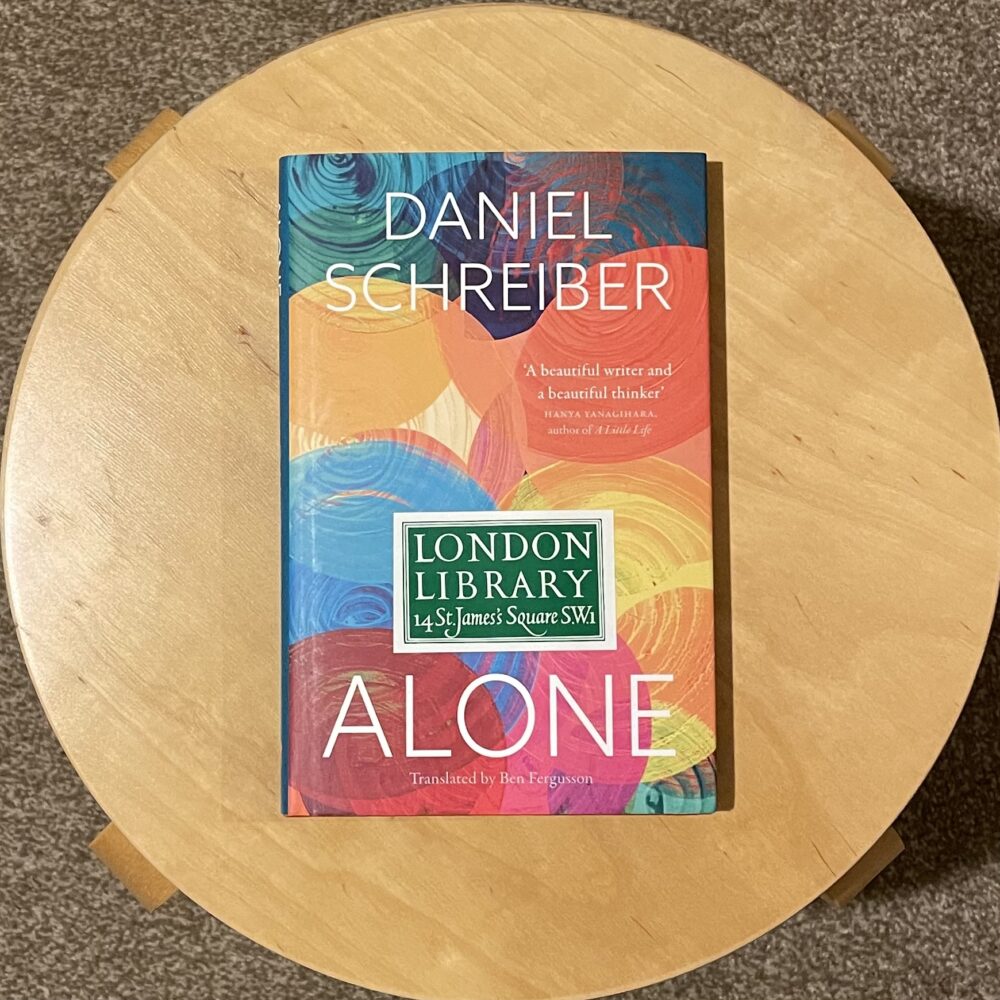‘Alone’ by Daniel Schreiber

I read Ben Fergusson’s translation of this book. The original spent almost a year as one of the bestselling books in Germany. For about the first third of the book, I couldn’t understand why: it seemed a bit dry and dull. But this is one of those books which suddenly ‘clicked’ for me, and I thoroughly enjoyed the remainder.
The book is a collection of reflections on solitary living and the importance of friendship. Many of Schreiber’s thoughts are inspired by his experiences during the COVID-19 pandemic, which forced more people than ever into a state of solitude.
I’ve written previously about my concern that the public health imperative to tackle loneliness risks threatening the benefits of solitude. This has personal relevance to me, as I enjoy a bit of solitude and time spent in my own company. Schreiber’s discussion draws neat distinctions between the two, which I found helpful. I also thought his reflection on how politicians sometimes use ‘loneliness’ as an excuse to push traditional, outdated social values was insightful: I’d never clocked that before.
Schreiber also touches on his experience of depression, albeit somewhat indirectly. Towards the end of the book, he touches on the idea that treatments for depression often focus on promoting a sense of self-efficacy. Schreiber notes that, actually, there is quite a lot in the world that we can’t control, and each of us carries a burden of goals that we know we’re unlikely ever to achieve. He argues that accepting a lack of self-efficacy is, therefore, just as important. I found this insightful: it felt like an equivalent of the loneliness versus solitude debate in a different area of life altogether.
I felt like this book prompted a lot of valuable reflections, and it’s one which I think will continue to provide food for thought for some time to come.
Some highlights:
How can one mourn losses that are ambiguous? How can we say goodbye to what we ourselves find difficult just to name? We want grief to be finite, to have, at some point, an end, but in truth, we grieve, continue our lives, grieve again, grieve anew, continue to grieve, and sometimes losses can be so ambiguous that our grief has no end.
I think that writers like walking so much because it is a good remedy for the dark state of mind that catches up with you, whether you like it or not, when you are working alone at your desk. It is not uncommonly the case that the great depressives of literary history have also been the most enthusiastic hikers.
When you do nothing but put one foot in front of the other, your mind seems to seek new paths. Body, mind and world come together in a new way, open up new conversations.
As the seasons progressed, I often couldn’t say for sure which day, week or even month it was. Somewhere along the line, I stopped noticing how nature was changing around me. It was as if my life had been packed in cotton wool, as if I was stuck in a dense fog that only parted at certain moments to reveal what was actually happening to and around me. One day I noticed that the summer heat had dried everything out, turned the grass yellow and wilted the birch trees. At some later moment in time, I suddenly registered that the drops on my mackintosh felt cooler than usual and that autumn was on its way. At some point I seemed to wake up on one of those walks to find that the leaves on most of the trees had turned and the first crowns were bare.
But, often, these discussions about the ‘loneliness epidemic’ simply mask a wistful longing for the good old times, for traditional social models of marriage and family that for many of us have outlived their relevance. Often, behind these discussions, is a political agenda that fails to recognize our social realities. Significantly, each revival of the prophets of social decline fails to propose that we start fighting loneliness by tackling racism, misogyny, ableism, antisemitism, homo-, trans- and Islamophobia, by addressing the social stigmatization of people living in poverty, all the structural phenomena of exclusion that produce social isolation every day and on a vast scale. The response of those who employ these grand warnings is almost always to invoke the magical power of the nuclear family.
The truth is that even painful emotions can gift us something. It is hard to see this at the time. When one is caught up in them and is doing everything one can to avoid them, one feels, of course, that one would be better off without them. But they often teach us things that we wouldn’t otherwise have learnt.
This post was filed under: What I've Been Reading, Ben Fergusson, Daneil Schreiber.